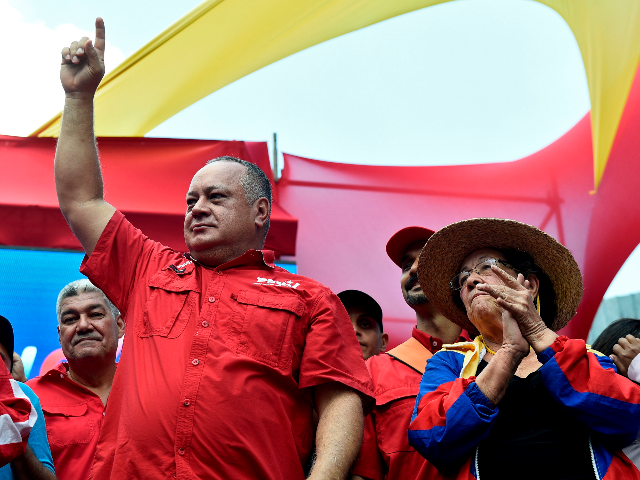Venezuela’s Supreme Court, run by loyalists to socialist dictator Nicolás Maduro, ordered the online news outlet La Patilla to pay senior chavista official, television show host, and alleged cartel chief Diosdado Cabello 30 billion bolivars ($4.7 million) for aggregating a 2015 article in which Hugo Chávez’s former security chief accused Cabello of drug trafficking.
La Patilla is a Venezuelan online publication that posts anti-socialist material, usually curating news from other sources rather than publishing original reports, as well as entertainment and lifestyle news. The story that Cabello sued over was an original report in the Spanish newspaper ABC revealing that the former security chief, Leamsy Salazar, had left Venezuela and was under DEA protector, willing to testify to Cabello being the head of the Cartel de los Soles (“cartel of the suns”).
The Cartel de los Soles is thus named because it is made up of members of the Venezuelan military, who wear sun medallions on their uniforms. It is an intercontinental cocaine trafficking operation, according to American law enforcement.
Cabello has held many positions in the chavista government but is currently the president of the “national constituent assembly,” an unconstitutional legislative body that Maduro created to replace the National Assembly following the opposition’s legislative victories in 2015.
La Patilla published the ruling against it in full, which finds the outlet guilty of “moral damage” for sharing the ABC story.
Responding to the ruling, La Patilla owner Alberto Ravell called it “judicial terrorism.”
“Diosdado, your judicial terrorism neither unnerves me nor exonerates you from your crimes,” Ravell wrote on Twitter.
Cabello, on his television program Con el Mazo Dando (“Hitting with the Mallet”), celebrated the win. “Truth imposed itself!” a headline about the ruling read on the program’s website Wednesday.
The Maduro regime, like Chávez before it, has invested heavily in persecution objective news outlets. Chávez notoriously shut down one of the country’s largest media broadcasters, RCTV, in 2007 for airing views contrary to the socialist “Bolivarian Revolution.” Maduro has repeatedly attempted to shut down Dolar Today, an online outlet that publishes the true value of the bolivar currency, not the government’s false exchange rates, but has failed as the website is run from the United States. Through legal and violent intimidation, the Maduro regime forced El Nacional, the country’s last remaining independent newspaper, to stop publishing a print edition in December 2018. It’s editor-in-chief, Miguel Henrique Otero, said at the time, “harassment of media outlets complete the profile of a pure dictatorship, with no separation of powers or freedom of expression.”
ABC journalist Emili Blasco reported that Salazar arrived in Washington in January 2015, choosing to flee the country and testify against Cabello. Salazar was Chávez’s intelligence chief for a decade and was well-versed in the inner workings of the regime, including the activities of high-ranking military officials like Cabello. Salazar said Cabello runs the Cartel de los Soles and uses the Cuban communist regime to protect sea routes to ship drugs into the United States, the report revealed, citing sources in the New York justice system, where prosecutors were building the case against Maduro.
The case definitively fell into New York’s hands when police arrested two of Maduro’s nephews, Francisco Flores de Freitas and Efrain Antonio Campo Flores, for attempting to fly into New York from Haiti carrying a cocaine shipment. They were sentenced to 18 years in prison for conspiring to “work with the FARC terrorist organization to send literally tons of cocaine to the United States,” according to then-acting Manhattan U.S. Attorney Joon H. Kim. The Revolutionary Armed Forces of Colombia (FARC) is a half-century-old Marxist terrorist organization with ties to the Maduro regime. Prosecutors believed the profits from the cocaine would go to funding a political campaign for their aunt, Maduro’s wife Cilia Flores.
During interrogation, the cousins said the cocaine they were found in possession of belonged to Diosdado Cabello, at the time the president of the federal legislature, the National Assembly.
Cabello responded to the report with a lawsuit rampage targeting La Patilla, two other Venezuelan outlets, ABC, and the Wall Street Journal. A U.S. court threw the case against the Wall Street Journal out in 2018 because, the judge ruled, Cabello did not provide any evidence that disproved “that he is, in fact, under investigation for his potential involvement in drug trafficking and money laundering activities.”
Cabello is one of several senior Maduro officials under severe U.S. sanctions. The U.S. Treasury accused him in a 2018 statement announcement sanctions on him of being “directly involved in narcotics trafficking activities.”
“Often referred to as the second most powerful man in Venezuela — after Maduro — Cabello has maintained significant leadership positions … Cabello has abused these influential positions in furtherance of his illicit and corrupt activities,” the Treasury stated. “Cabello organizes drug shipments being moved from Venezuela through the Dominican Republic, and onwards to Europe.”
A June 2018 report revealed that the Treasury had confiscated $800 million in assets that Cabello had hidden in the United States.

COMMENTS
Please let us know if you're having issues with commenting.